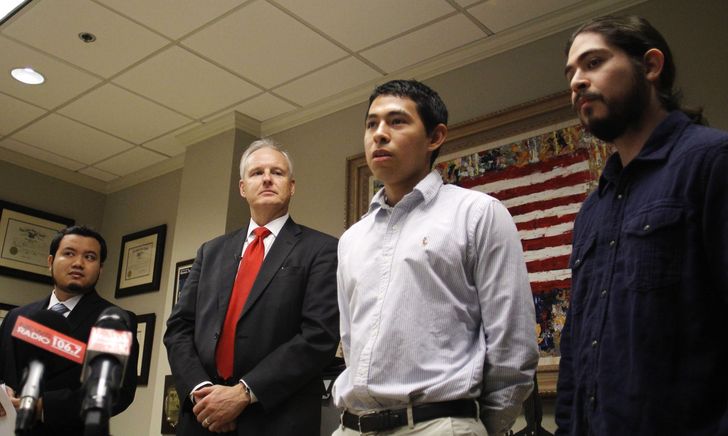Source : Wall Street Journal
By : Jess Bravin and Brent Kendall
Category : Bail Bondsman in Sanford, Bondsman in Seminole County

Supreme Court Justices Appear Split on Immigration Case
The Supreme Court appeared as split as the nation over immigration policy Monday, with the justices divided over a 26-state challenge to Obama administration plans for deferring deportation of some four million illegal immigrants whose children are U.S. citizens. Four conservative justices at oral arguments in the case appeared critical of the plan, called Deferred Action for Parents of Americans, which lower courts temporarily blocked after Texas filed its challenge on behalf of Republican-leaning states. Four liberal justices suggested that the case had no business being before the courts at all. Justice Ruth Bader Ginsburg, one of the liberals, set out perhaps the only points of agreement. “We have 11.3 million undocumented aliens in the country, and Congress, the legislature, has provided funds for removing about [400,000]. So inevitably, priorities have to be set,” she said. The February death of conservative Justice Antonin Scalia reduced the court to eight members. After extended arguments involving four lawyers, it appeared possible that the panel could deadlock 4-4, which effectively would kill the immigration plan for the rest of President Barack Obama’s time in office.
Regardless of the outcome, it isn’t likely that immigrants covered by the administration program, who have been in the U.S. since at least 2010 and lack criminal records, will be deported anytime soon. Yet there were hints that the administration might eke out a win on technical grounds, through a finding that Texas used the wrong procedure to raise its objections. Justice Anthony Kennedy, a conservative on most issues, suggested that rather than a lawsuit seeking to invalidate the deferred-action program itself, Texas should instead have raised an administrative challenge to related regulations that allow certain aliens to work. Under that approach, Texas likely would have to wait until the Department of Homeland Security made an administrative decision or failed to act in a timely manner on the challenge before filing suit. It also would spare the Supreme Court the task of resolving contradictory elements of immigration law, which has been patched together through regulations and executive practices since the last congressional overhaul in 1986.
From afar, Democratic presidential candidates Hillary Clinton and Bernie Sanders, preparing for New York’s primary Tuesday, weighed in, using Twitter to say they would go further than President Barack Obama to help illegal immigrants. Republican candidates have pushed in the opposite direction, with both businessman Donald Trump and Texas Sen. Ted Cruz pledging to build a wall along the Mexican border. Mr. Obama unveiled the deferred action plan in November 2014, styling it as the latest such stopgap after the House killed a Senate-passed immigration update. The plan seeks to stabilize these immigrants’ lives by formally acknowledging their presence and authorizing them to work, pay taxes and enter the Social Security program. U.S. Solicitor General Donald Verrilli, who represents the administration before the court, said the plan resembles initiatives by previous administrations. “Otherwise, if you can’t work lawfully, you’re going to either not be able to support yourself and be forced into the underground economy,” Mr. Verrilli said. Chief Justice John Roberts questioned the breadth and logic of the administration’s legal arguments, wondering whether its position would allow the president to grant deferred deportation “to every unlawfully present alien in the U.S. right now.”
Mr. Verrilli said there were limits, including congressional direction “to prioritize the removal of criminal aliens and aliens detained at the border. There’s no way we could give deferred action to those populations.” Texas’ lawyer, state Solicitor General Scott Keller, said Congress “restricted work and benefits as an alternative mechanism to enforce immigration law.” He added, “Congress put forward those barriers to work and to benefits precisely to deter unlawful immigration. What the executive [branch] is trying to do here is flout that determination.” Conservatives have accused the administration of exceeding executive authority in other areas, including environmental regulation and the 2014 decision to exchange five Taliban detainees at Guantanamo for Sgt. Bowe Bergdahl without notifying Congress in advance. The policy questions, however, took a back seat to procedural issues that have enveloped the case from the outset. Texas bases its legal ability to file the suit on the claim that illegal immigrants who receive deferred-action status will be entitled to driver’s licenses, imposing administrative costs on the state because the $24 license application fee doesn’t cover the processing expenses. Mr. Verrilli argued that if so incidental a burden was enough to let states sue to invalidate federal programs, a range of policy decisions will end up in the courts. Justice Stephen Breyer, a member of the court’s liberal bloc, agreed, citing 1920s decisions rejecting lawsuits by taxpayers and state officials that alleged a federal program aimed at reducing infant mortality was unconstitutional.
The court reasoned then that if such a suit could proceed, “before you know it, power will be transferred from the president and the Congress, where it belongs, to a group of unelected judges.” Mr. Keller said the cases weren’t comparable, because the state itself faced costs imposed by the federal program. Thomas Saenz, a lawyer representing three unidentified, undocumented mothers of children who are U.S. citizens, backed the administration. Mr. Saenz said his clients live in “daily fear that they will be separated from their families and detained or removed from their homes.” A lawyer representing the Republican-led House of Representatives, Erin Murphy, said the deferred action plan essentially put in place ideas Congress had rejected. “Three years ago, the executive asked Congress to enact legislation that would have given it the power to authorize most of the people that are living in this country unlawfully to stay, work and receive benefits, and Congress declined,” she said. Chief Justice Roberts recalled that Mr. Obama, in announcing an earlier program granting deferred action to illegal immigrants brought to the U.S. as children, said he couldn’t go further. “He said that if you broadened it, this is a quote, ‘Then, essentially, I would be ignoring the law in a way that I think would be very difficult to defend legally.’ What was he talking about?” the chief justice said. “What happened here is that the president and the secretary [of homeland security] went to the Office of Legal Counsel and asked for an opinion about the scope of their…discretionary authority, and they got one. And they exercised it consistently with that and up to the limits of that and no further,” Mr. Verrilli said. No justice asked whether the deferred-action program violated the president’s constitutional duty to “take care that the laws be faithfully executed.” The omission was striking, because the court itself, in a January order, inserted the question into the case and directed both sides “to brief and argue” it. Rarely if ever has an executive policy been challenged for violating the take-care clause, and the court’s decision to add the question suggested some sympathy for conservative claims that Mr. Obama has disregarded his statutory obligations. The eight justices’ lack of interest in the question may indicate it had been added at the urging of Justice Scalia and in his absence lacked a vocal champion.
Read More : wsj.com/articles/supreme-court-focuses-on-states-legal-right-to-question-immigration-policy-1460994167















